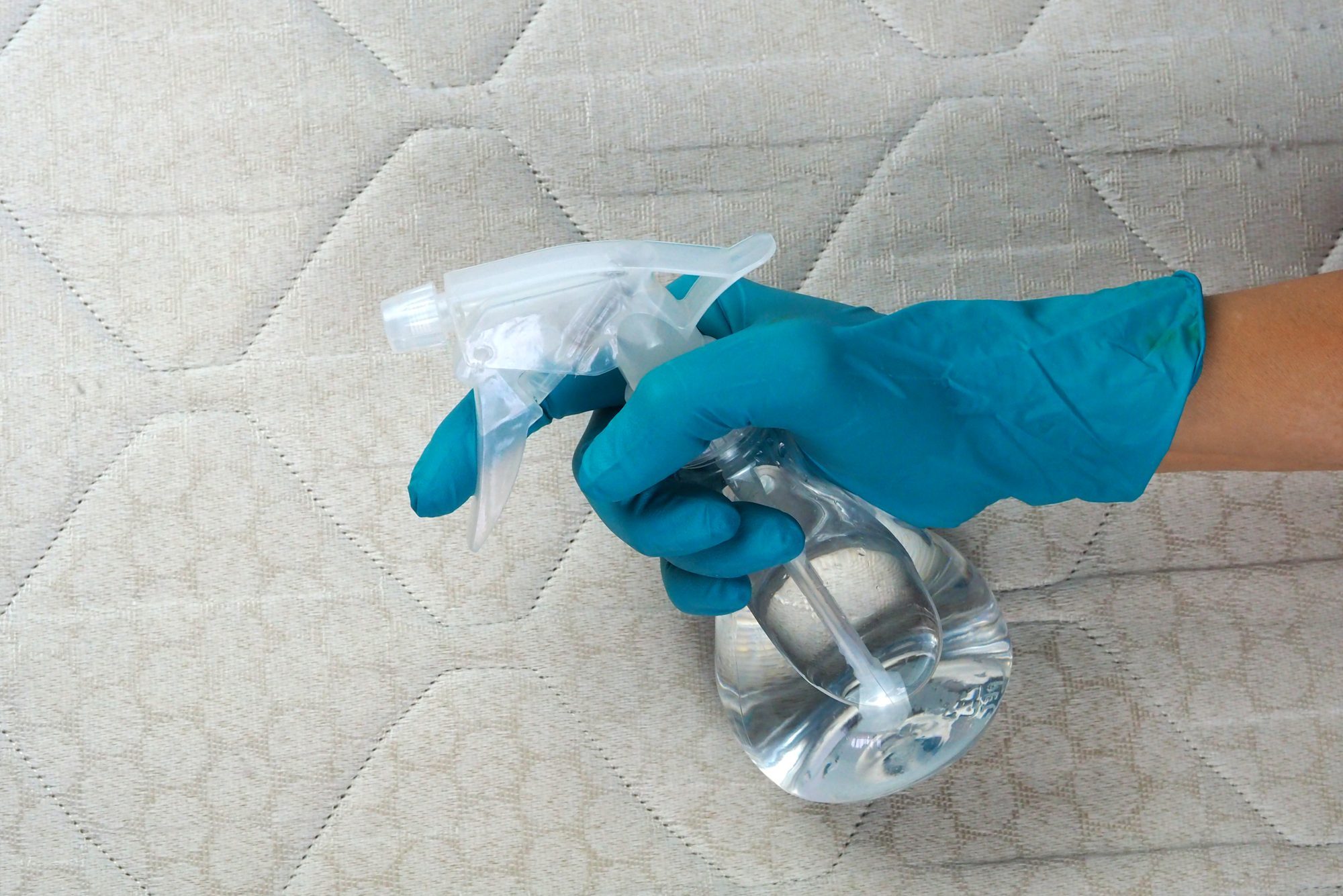Asking if you can do something is not the same as asking if you should. A leading health expert answers our questions about disinfecting with alcohol.

Can I Spray Alcohol on My Bed To Disinfect?

Disinfecting has been on everyone’s mind since the pandemic began. Sales of disinfecting wipes and other hygiene products have soared in recent years, with no signs of slowing any time soon.
It’s one thing to wipe down your countertops with store-bought or homemade disinfecting wipes, but what about porous items like your mattress? After all, mattresses are huge repositories for dead skin and other organic material that microorganisms and dust mites feed on. Did you know mattresses actually get heavier the longer you sleep on them?
While that sounds pretty gross, it doesn’t mean you’ll get sick from your mattress, or you need to immediately douse it in chemicals. Your risk of illness from any hazard depends on your personal vulnerability and exposure levels. Still, would using alcohol help? I talked to Allen Rathey, director of the Indoor Health Council, to find out.
On This Page
Can Isopropyl (aka Rubbing) Alcohol Be Used as a Disinfectant?
Yes, but it helps to define what “disinfectant” means. It also depends on what you’re trying to disinfect.
According to the Environmental Protection Agency (EPA), disinfectants kill viruses and bacteria on surfaces with chemicals. Note the “on surfaces” distinction — that means hard, nonporous surfaces, not soft items like mattresses and bedding.
Rathey says some products the EPA registers as disinfectants will reduce germs on soft surfaces—just not necessarily at the same level as nonporous surfaces.
In casual use, Rathey says people think of disinfecting as reducing bacterial load and making things more hygienic. In that sense, alcohol can be used on mattresses, but keep the distinction in mind.
If you use alcohol for disinfecting anything — whether it’s surfaces, your hands or your mattress — the Centers for Disease Control and Prevention (CDC) says that a 60% to 90% dilution is the most effective. Curiously, higher concentrations do not work as well.
Can I Spray Alcohol on My Bed To Disinfect?
You can, but whether you’d want to is debatable.
For your bedding, stick to the washer and dryer. It’s much more effective, not to mention easier. “Due to their porous nature, hot water laundry and hot drying is the best approach for sheets,” Rathey says.
What about the mattress itself? It’s OK to use an EPA-registered disinfectant on many mattress types, Rathey says, but test first for colorfastness before you start spraying that expensive pillow-top. Always follow label directions for the amount of time to soak, and any dilution requirements.
“While isopropyl alcohol will help lower germ counts,” Rathey says, “the practicality is questionable, as you’d need to soak the surface and allow wet dwell time.”
Dwell time means how long the disinfectant needs to sit on the surface or in the fibers of the material. Depending on what organisms you’re trying to kill, this could be seconds, minutes or even longer. Soaking a mattress would take a ton of alcohol, making this idea pretty untenable.
Alcohol evaporates quickly, too, further complicating the time constraint. Not to mention, alcohol stinks.
How Often Should You Disinfect a Bed?
According to the Sleep Foundation, you should clean your mattress every six months or so. Cleaning is different from disinfecting, though, so it’s really up to you to decide when disinfecting is necessary.
Rathey says if you keep your mattress clean, disinfection could be done as needed. This could be after someone has been sick, or the mattress becomes soiled.
Preventing mattresses from getting dirty in the first place is your first defense against germs. Remove shoes at the front door, Rathey says. Provide an entry mat to capture dirt and dust before it enters your home and makes its way to your bedroom. Mattress protectors provide a physical barrier and should always be used.
If you’re traveling and worried about the cleanliness of the sheets, Rathey says hotels generally launder them sufficiently. If you’re in a seedy motel and the sheets look shady, sure, you can spray them with alcohol. But again, you’d have to soak the bed (did you bring enough with you?) and live with the smell.
And, as with any product, Rathey recommends testing it first on an inconspicuous spot. You don’t want to be on the hook for ruining motel property.




















